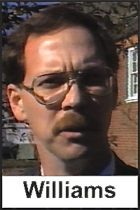Rascals case in brief
In the beginning, in 1989, more than 90 children at the Little Rascals Day Care Center in Edenton, North Carolina, accused a total of 20 adults with 429 instances of sexual abuse over a three-year period. It may have all begun with one parent’s complaint about punishment given her child.
Among the alleged perpetrators: the sheriff and mayor. But prosecutors would charge only Robin Byrum, Darlene Harris, Elizabeth “Betsy” Kelly, Robert “Bob” Kelly, Willard Scott Privott, Shelley Stone and Dawn Wilson – the Edenton 7.
Along with sodomy and beatings, allegations included a baby killed with a handgun, a child being hung upside down from a tree and being set on fire and countless other fantastic incidents involving spaceships, hot air balloons, pirate ships and trained sharks.
By the time prosecutors dropped the last charges in 1997, Little Rascals had become North Carolina’s longest and most costly criminal trial. Prosecutors kept defendants jailed in hopes at least one would turn against their supposed co-conspirators. Remarkably, none did. Another shameful record: Five defendants had to wait longer to face their accusers in court than anyone else in North Carolina history.
Between 1991 and 1997, Ofra Bikel produced three extraordinary episodes on the Little Rascals case for the PBS series “Frontline.” Although “Innocence Lost” did not deter prosecutors, it exposed their tactics and fostered nationwide skepticism and dismay.
With each passing year, the absurdity of the Little Rascals charges has become more obvious. But no admission of error has ever come from prosecutors, police, interviewers or parents. This site is devoted to the issues raised by this case.
On Facebook
Click for earlier Facebook posts archived on this site
Click to go to
Today’s random selection from the Little Rascals Day Care archives….
Click for earlier Facebook posts archived on this site
Click to go to
Today’s random selection from the Little Rascals Day Care archives….
City sidewalks, busy sidewalks: An upbeat dispatch from the DNC
Sept. 7, 2012
Having met with less than overwhelming interest earlier in the week in front of the bustling Charlotte Convention Center, I narrowed my focus.
Thursday I situated my “Exonerate” placard at the entrance to the peripheral and unhurried Crowne Plaza hotel, convention headquarters for the North Carolina Democratic Party, and our message was well received (except for an overly territorial security guard).
Not only did several delegates express support for the Edenton Seven, but also a dozen or so more took cards with the site address. And I was able to bend the ears of reporters from Greensboro, Rocky Mount and the Outer Banks, as well.
Yes, the delegates are mostly ordinary folks, not influential officials – I didn’t see Gov. Perdue – but I’m grateful they will take home a greater awareness of this shameful injustice, still unaddressed, in their own state.
‘And believes to this day she was molested….’
 Oct. 7, 2013
Oct. 7, 2013
“Today (in 2001), few contend that the interview techniques used at the outset of the Fells Acres child abuse investigation, in 1984, were proper and reliable. Middlesex County (Mass.) prosecutors admitted to appellate judges in the 1990s that those techniques – characterized by repeated suggestive questioning about molestation despite initial avowals by the children that nothing of that kind occurred – would not be employed today.
“In 1998, Superior Court Judge Isaac Borenstein ruled that under current Massachusetts law, the manner in which the Fells Acres children were first interrogated would have constituted grounds to have the case dismissed.
“That questioning included hundreds of taped episodes such as this:
- Pediatric interviewer (Susan J. Kelley): “Did the clown touch you?”
- Child witness: “No. …”
- Interviewer: “You said the clown took your clothes off. …”
- Child: “Yeah. …”
- Interviewer: “What happened?”
- Child: “Well, nothing really.”
- Interviewer: “Did the clown touch … Will you show me if the clown touched any part of you?”
- Child: “No, he didn’t touch me.”
“The child interviewed in the above example testified against Gerald Amirault at his 1986 trial, and believes to this day that she was molested by an ‘evil clown.’ ”
– From “Memories questioned, but victim still certain of ‘evil’…. Studies say kids can be easily led” by Tom Mashberg in the Boston Herald (July 8, 2001)
So what happens to the professional prospects of a “pediatric interviewer” whose ludicrously biased questioning led to the conviction of not only Gerald Amirault, but also his mother and sister? In the short term, Susan J. Kelley had to endure even her prosecutorial allies disavowing her “suggestive techniques.”
Soon, however, Kelley’s career was back on track, unimpeded by the tragedy wrought by her blindered incompetence. She has never apologized…. although her lengthy current resume does omit mention of her role in the day-care ritual-abuse hoax, either as a prosecutorial interviewer or as an academic apologist.
‘If he made such a statement, it was not a threat’ (!)
 Aug. 3, 2012
Aug. 3, 2012
“Betty Ann Phillips, who had worked at the day care center, said (in the first episode of “Innocence Lost’) that she had complained to (District Attorney H.P.) Williams when she found out that indictments had been filed in her child’s name.
“She said Williams had advised her ‘not to go out on the street and say you’re unhappy with what we have done.’
“‘And then in the next sentence he said, “Because you know that all of the children are saying that you were the lookout while this was going on.”’
“In a telephone interview, Williams did not dispute that he had told Mrs. Phillips he had evidence from other children that she had acted as a lookout, but… if he made such a statement to her it was not meant as a threat.”
– The Associated Press, May 9, 1991
Prosecutors claimed WHAT happened here?
 April 6, 2015
April 6, 2015
A team from the Duke Wrongful Convictions Clinic recently traveled to Buncombe and Madison counties to collect documents from court clerks’ offices, to interview witnesses and to inspect locations where Junior Chandler allegedly abused children who rode his day-care bus.
Billy Chandler, Junior’s brother, and Clayton Rice, his lifelong friend, guided the Duke investigators (and me) along Junior’s daily route. The narrow, twisting backroads led us to the sites along the French Broad River where prosecutors claimed Junior had repeatedly committed the most bizarre sexual crimes imaginable.
The photo at the right shows a typical vantage. It has always seemed incredible to me that Junior – as described in Mark Montgomery’s amended petition for writ of certiorari – “would drive off his route to a parking area next to the French Broad River, strip the clothes off the toddlers, troop the naked children down to the river, put them on a rowboat, proceed to insert various objects into their anuses and vaginas, bring them back to the bus, put their clothes back on and deliver them home.”
Actually visiting and walking around the supposed crime scenes, which are completely open to neighbors and passersby, only reinforces my impression: The allegations against Junior are simply inconceivable.
So where do things stand as Junior Chandler approaches his 29th year in prison? Clinic co-director Theresa Newman provided this cautious update: “The Duke Wrongful Convictions Clinic has spent the past few months studying the file passed to them by previous post-conviction counsel, researching the developments in the relevant medical and psychological science since the mid-1980s, and otherwise trying to master this complicated and complex case. We are now moving into the next phase of our typical investigation….”
The title of Newman’s illuminating TEDx talk at Elon University couldn’t be more apt: “Waiting is a Beast.”











0 CommentsComment on Facebook